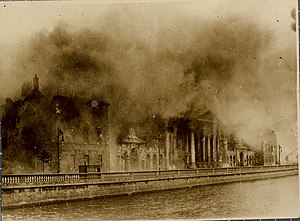Battle of Dublin (1922)
| Battle of Dublin | |||||||
|---|---|---|---|---|---|---|---|
| Part of the Irish Civil War | |||||||
 The Four Courts ablaze during the battle, 30 June 1922 |
|||||||
|
|||||||
| Belligerents | |||||||
|
|
|
||||||
| Commanders and leaders | |||||||
|
Rory O'Connor Ernie O'Malley Oscar Traynor |
Michael Collins Paddy Daly Tom Ennis |
||||||
| Strength | |||||||
| 200 troops in Four Courts, ~500 more in city |
4,000 troops | ||||||
| Casualties and losses | |||||||
| at least 15 killed, unknown wounded, over 450 taken prisoner |
at least 29 killed 150 wounded | ||||||
| At least 35 civilians killed, over 100 wounded | |||||||
The Battle of Dublin was a week of street battles in Dublin from 28 June to 5 July 1922 that marked the beginning of the Irish Civil War. Six months after the Anglo-Irish Treaty ended the recent Irish War of Independence, it was fought between the forces of the new Provisional Government, and a section of the Irish Republican Army (IRA) who opposed the Treaty. The fighting began with an assault by Provisional Government forces on the Four Courts building, which had been occupied by the Anti-Treaty IRA, and ended in a decisive victory for the Provisional Government.
On 14 April 1922, about 200 Anti-Treaty IRA militants led by Rory O'Connor occupied the Four Courts in Dublin, resulting in a tense stand-off. They wanted to spark a new armed confrontation with the British, which they hoped would bring down the Anglo-Irish Treaty, unite the two factions of the IRA against their former common enemy and thereby restart the fight to create an all-Ireland Irish Republic. At the time the British Army still had thousands of soldiers concentrated in Dublin, awaiting evacuation.
Winston Churchill and the British cabinet had been applying pressure on the Provisional Government to dislodge the rebels in Four Courts as they considered their presence there as a violation of the Treaty. Such pressure fell heaviest on Michael Collins, President of the Provisional Government Cabinet, and effective head of the regular National Army. Collins, a chief IRA strategist during the War of Independence from Britain, had resisted giving open battle to the anti-Treaty militants since they had first occupied Four Courts the preceding April. Collins' colleagues in the Provisional Government Cabinet, including Arthur Griffith, agreed that Collins must mount decisive military action against them.
...
Wikipedia
